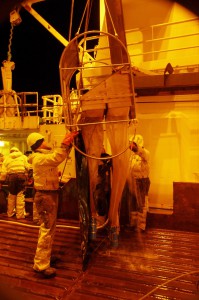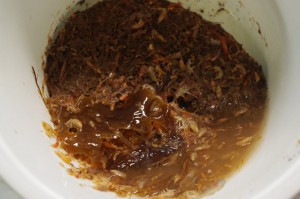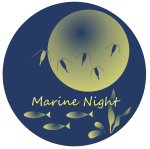In my mind, the past few days on the Helmer Hansen have been unlike any academic experience I have ever encountered. Of course, I have spent long nights in the lab, or studying for exams, but those nights have left me mentally drained and eager to move and get outside. These last few nights on the Helmer Hansen have been an entirely different matter. In my mind, the closest comparable experience is running a marathon. As an endurance athlete, I am very familiar with the long grind of the marathon. It feels great the first eight miles; things start to hurt around mile ten, and by mile 18 I’m really starting to worry….but then something magical happens (if I’m lucky). Right around mile twenty, after hours of pushing firmly on the wall forming in my head, I seem to fall through it, and my mind settles in a peaceful place somewhere on the trail in front of me and I no longer think about my aching achilles or upset stomach. At this point, I am completely absorbed in the movement of running. My thoughts are gone, and I feel like I could go forever. Some people call this ‘flow.’
Here on the Helmer Hansen, I reached this place around 4am in the fish lab on the 13th. After a few hours of stumbling through the motions, longing for my bed and cursing the dying fish in my hands, everything changed in what would have felt like a very short period of time, had I noticed. Suddenly, all thoughts of sleep, food, and tea vanished and my arms and hands moved automatically, and my mind entered the peaceful state of flow. I knew exactly what needed to be done, and suddenly I knew exactly how to complete it in the most thorough and efficient manner. Hours went by in minutes.
This is why I live for the marathon. The months of training, the injuries, the gruesome miles between eight and eighteen, all of these unpleasant things are eclipsed by the forty blissful minutes from mile 20 to 26. Of course, things do not end after the finish line. Leaving flow can be as painful as entering it. Things are great (and I mean really great) for a few hours until the endorphins wear off. Then comes the nausea, and the headaches and the deep sad sense of loss as you realize that it’s over. This is when, of course, you start planning for the next one….the next time you can enter that brief, yet blissful state of existence.
Here on the Helmer Hansen we had a packed four days of sampling. Day and night were consumed by filtering water and processing Trawls and Epibenthic sleds. There was no time to sleep or even think about food or water. I was completely lost in the moment, and specifically in the physical movements of the process. Of course, as with running, all things must come to an end. First, things felt really good, as I was consumed by the relief of being finished, but then I was reminded
that the return to the real world can be quite painful. First, the basic human needs that I had been neglecting made themselves heard: sleep and water being at the top of the list, then came that inevitable and intense feeling of loss as I was wrenched from my hours of intense focus. There is no way to just flip the switch; it is too hard to let go, and when you do, a short mourning period seems to be necessary. But then soon enough, just like when I finish a marathon, came the plans for my next cruise and the thoughts about the next time I can reach the state of flow. Who could have guessed that the hours of sieving muddy samples on the deck of the HH in the cold and dark of the Arctic winter, or the hours spent with a pair of tweezers hand-picking amphipods from a bucket could elicit such an emotional response? People say that marathons are addicting, and I think I can now say the same for field work. No wonder scientists keep coming back; I certainly know that I will, and as a young masters student just entering the world of research, I find that notion comforting.
Text: Maeve McGovern





